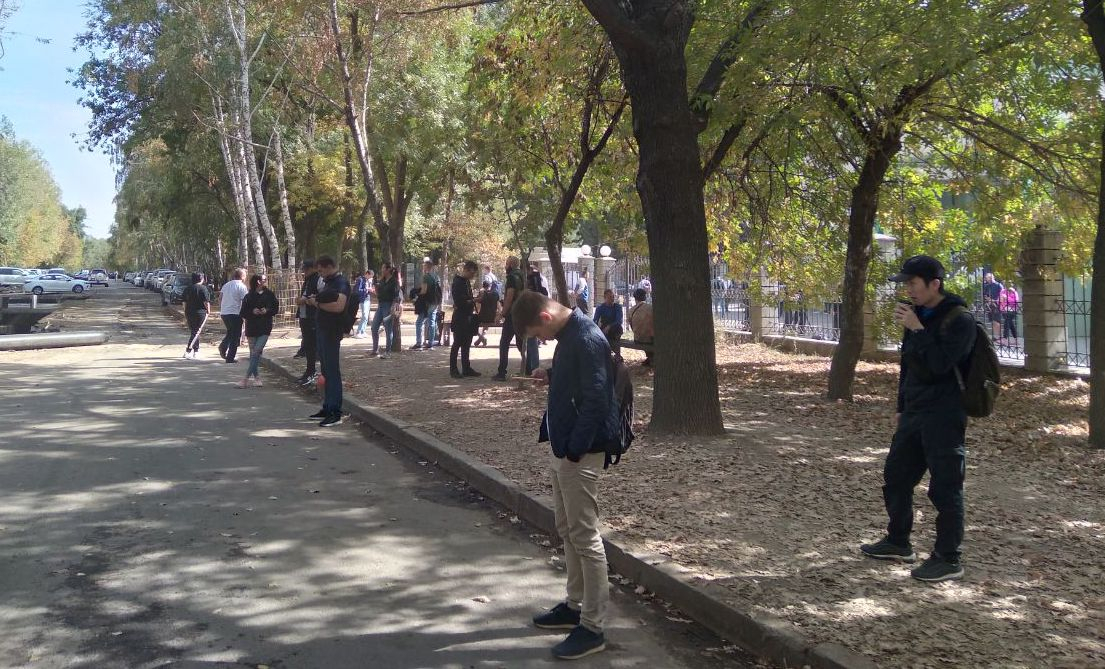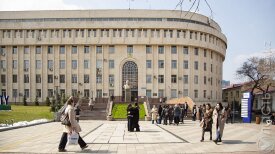Russians have left their country en masse in previous weeks in an effort to avoid conscription. More than 200,000, mostly men, have crossed into Kazakhstan in the two weeks after September 21, when President Vladimir Putin decreed a “partial mobilization” to beef up military contingents in Ukraine. The inflow, which still continues, has caused worries among the local population, especially regarding inflation, rent, and social cohabitation.
Kazakhstan’s government was quick to placate the anxiety among the population by showing how the initial trend of a massive inflow during the first days, was later followed by a progressive outflow of Russians to other countries. Evidently, for many, Kazakhstan was a stepping stone to a safe haven further away from Russia.
Yet, the first consequences of the inflow of Russians were substantial: Galloping inflation and occasional social tension concretely affected the local population.
A Bubble About to Burst
Most experts believe that the course and duration of the war will play a role in the migration flux. Minor checks at the frontier with Kazakhstan made an escape to the south a logical and quick option for the draft dodgers from Russia. The open-border policy allows Russians to cross into Kazakhstan with just an ‘internal’ passport, yet they still have to apply for an international passport if they wish to settle in Kazakhstan or travel further.
For those who have an international passport in hand, Kazakhstan seems to be regarded as a first hub before the next move. More than 150,000 Russians have left Kazakhstan since September 21, underscoring the highly-mobile nature of the draft dodgers.
Malika Toqmadi, co-founder of the Astana-based public policy research center PaperLab and a doctoral researcher at the University College London, told Vlast that, should the war last for more than a couple of years, the incoming Russians might settle in Kazakhstan.
“If the war ends within a year or so, then we might see the demographic balance go to pre-war levels. If however the conflict persists and the Russian political and economic hardship exacerbates, some of the migrants might choose to stay here long-term. Moreover, there might be other waves depending on the severity and magnitude of the crisis,” Toqmadi said.
Should Russia stay the course and continue a war that is antagonizing most of its diplomatic and trade partners, as highlighted in a UN General Assembly vote last week, the long-term consequences are poised to create socio-economic imbalances in the country.
This scenario could lead to further outbound migration, according to Rakhimbek Abdrakhmanov, head of the Center for Political and Economic Research.
“We believe that in 2022-2023 Russia will experience further socio-economic and political destabilization caused by the oil embargoes, new sanctions, and the effects of sanctions already in place. The future macroeconomic policy of Russia is still unclear, and this determines the flow of migrants in the long run,” the economist told Vlast.
Among the Russians who stayed, since the beginning of the war in February, around 80,000 have received a work permit in Kazakhstan, but the statistics on how many among these have found permanent jobs are unreliable.
An Emotional Rollercoaster for Local Residents
Shocked and horrified by the war, most local Kazakhstanis have welcomed the incoming Russians, as they hope that fewer Russians joining active combat could weaken the military operation by the aggressor in this conflict.
Solidarity with Ukrainians was strong and evident since the beginning of the war in February, with one of the largest urban demonstrations in Almaty.
On March 6, around 1,500 people gathered in Kazakhstan's largest city, calling for peace, draped in Ukrainian flags.
Aversion towards the war has grown in the following months, exacerbated by a flurry of Russian propaganda targeted against Kazakhstan.
At the same time, pro-Ukrainian solidarity and anti-war pushback against Russia created an inner tension towards the incoming Russian draft dodgers. On the one hand, they were seen as escaping the war, while on the other hand, they became the symbol of an oppressive and warmongering regime.
People in Kazakhstan rejoiced and showed support towards the most active layers of the Russian population that demonstrated against the war. According to Toqmadi, the gendered aspect of the exodus from Russia should be studied further.
“There is a considerable share of women among the migrants. Moreover, in the coming months, we can expect more women from Russia crossing the border. They will follow their husbands, who had left first, in haste,” Toqmadi said.
A New Labor Market?
A substantial number of Russians who have chosen to stay managed to receive a work permit and resume their careers in Kazakhstan. Official statistics are unreliable, but the scale of the incoming wave of new workers is in the tens of thousands.
Toqmadi argues that the profile of the incoming workers could result in a positive injection of specialists. “Kazakhstan might benefit from relocated businesses and a highly qualified workforce. This wave could bring investments, jobs, and competition to the market.”
Speaking at SöZ Astana Public Talk, Russian political analyst Yekaterina Shulman said that Kazakhstan is considered by most Russian migrants as “a center of stability in Eurasia.”
Still, there is a concrete possibility that socioeconomic tensions could arise from the cohabitation between those who hastily left their jobs and families in Russia and those who struggle to find and keep a job in Kazakhstan.
“The arrival of a large number of people, many of whom will not have anything to live on in two weeks, obviously creates a risk. At the same time, these are working people with a higher education, who will have to honestly earn their daily bread, which is an advantage” Shulman said.
Dozens of companies have relocated to Kazakhstan or are planning to do so. Businesses that transfer their headquarters to Kazakhstan have proved to be inclined to hire Russian nationals. “There were already reports of Russian businesses preferring to hire Russian citizens. Such discriminatory practices should be investigated, so that this remains an exception, rather than the rule,” Toqmadi said.
It is yet unclear how many will stay and settle in Kazakhstan. Most likely, low-skilled migrants who obtain low-paying jobs will not have the means to travel further.
“Low-skilled migrants might represent a considerable share of those who stay, because they do not have the resources to travel further. They would probably become competitors with local internal migrants, creating socioeconomic fault-lines,” Toqmadi said.
Linking the labor market and macroeconomic imbalances, Abdrakhmanov said risks could outweigh advantages.
Toqmadi added that the Russian migration has revived popular conversations around language, identity, and colonial past. "It seems Kazakhstan needed the practical case of the arrival of the 'other' to start discussing some difficult issues that had been taboo since independence."
While political analysts and economists carefully weigh risks and opportunities, Kazakhstanis are facing a dire socioeconomic situation, with rapid changes in the demographic composition in city centers and a sharp inflation in consumer goods and real estate prices. The authorities so far have used the national fund and adopted timid policies to weather the storm, but the question of whether the population will be able to withstand the ‘new normal’ is still on the table.
Note: The article was slightly modified on 22 October 2022 with the addition of some quotes.
Поддержите журналистику, которой доверяют.








